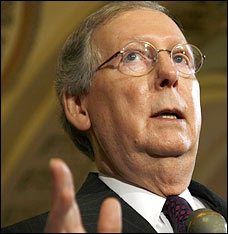 Was it President Barack Obama finally using the power of his office to force the Senate and Senate Republicans to action after a logjam of bottled up nominees? Or was it merely that the Republicans would have done it anyway?
Was it President Barack Obama finally using the power of his office to force the Senate and Senate Republicans to action after a logjam of bottled up nominees? Or was it merely that the Republicans would have done it anyway?
In politics perception is reality, and although GOPers and talk radio hosts will pooh-pooh the news that after Obama reportedly laced into Minority Leader Mitch McConnell about roadblocked nominees and threatened recess the floodgates were partially opened, the new result will likely be a boost for Obama in terms of media image, it will with his party’s increasingly disgruntled base. Increasingly, many Democrats perceive Obama as President who is not on a roll but who can be rolled by Republicans.
But, whether the truth is in the White House Obama-made-it-happen version or the Republican version — which does smack a bit of spin given how long the appointments were stalled — it likely means this: you can expect Obama to be more assertive with Republican leaders in the future. Particularly in his new political world where the Democrats’ Senate supermajority has vanished.
The Senate confirmed a huge group of administration nominees on Thursday, following a tense exchange between President Barack Obama and Senate Minority Leader Mitch McConnell (R-Ky.).
At a White House meeting with bipartisan congressional leaders on Tuesday, Obama warned that he would make recess appointments if the logjam over nominees wasn’t broken before the Senate left for the Presidents’ Day break.
“Mitch, this is unprecedented,” the president said, gesturing forcefully on the Cabinet Room table, according to aides. “If you don’t move any, I’m going to do some [recess] appointments.”
The 27 confirmations mean no recess appointments will be needed during this break, top administration officials said. Recess appointments, which a president can make when Congress is not in session, are temporary and generally last to the end of the year.
In a statement Thursday night, Obama said: “At the beginning of the week, a staggering 63 nominees had been stalled in the Senate because one or more senators placed a hold on their nomination. … And so on Tuesday, I told Senator McConnell that if Republican senators did not release these holds, I would exercise my authority to fill critically-needed positions in the federal government temporarily through the use of recess appointments. … Since that meeting, I am gratified that Republican senators have responded by releasing many of these holds and allowing 29 nominees to receive a vote in the Senate. While this is a good first step, there are still dozens of nominees on hold who deserve a similar vote, and I will be looking for action from the Senate when it returns from recess. If they do not act, I reserve the right to use my recess appointment authority in the future.”
Democrats say that McConnell blinked. Republicans contend that the list shows they’re not obstructionist.
A senior Senate Republican leadership aide said: “We cleared something like 35 nominees before the last recess, too. That’s what happens before a recess. This isn’t because anyone blinked.”
TPM reports more of a Republican pushback response, saying Obama didn’t make it happen:
A Republican aide scoffed at the reports as White House “spin,” adding that the confirmations last night were nothing unusual.
“We clear the nominees that can be cleared before going on a recess. We did it on Christmas eve, too–but that was a larger group than this,” the aide told TPMDC.
Perhaps one reason why this story will have a lot of impact was due to the blanket hold Sen. Richard Shelby had put on Obama nominees in a move that made Shelby the picture boy for smelly political manuevers and earmarks in Congress. He lifted it. Coming on the heels of Shelby backing down, the GOP move at least gives the appearance of Obama starting to budget the GOP Congressional boulder.
The danger: that Republicans will take a lot of heat from talk show hosts and other activists for unbottling the nominees and dig in their heels.
Which would mean Obama — like George W. Bush before him — would indeed have to start making recess appointments.
Joe Gandelman is a former fulltime journalist who freelanced in India, Spain, Bangladesh and Cypress writing for publications such as the Christian Science Monitor and Newsweek. He also did radio reports from Madrid for NPR’s All Things Considered. He has worked on two U.S. newspapers and quit the news biz in 1990 to go into entertainment. He also has written for The Week and several online publications, did a column for Cagle Cartoons Syndicate and has appeared on CNN.
















